Aussie Aussie Aussie Oi Oi Oi - Good morning, Australia!
Aussie Aussie Aussie Oi Oi Oi
PART ONE: The fantasy of Zero Covid and the rise of the first democratic police state.
Americans have the wrong idea about Australia.
Thanks to some brilliant tourism branding and Crocodile Dundee, we think of it as rough-n-ready frontier country, Montana with bigger beer cans. The dingo ate my baby!
In reality it’s Canada with a mean streak. The Karens are in charge and they are mad.
(This is Daniel Andrews, Premier of Victoria. Imagine the owner of the hippest coffee shop in town crossbred with a minor Central American despot - a Somoza, maybe - and you get the idea.)
Anyhow, Covid was perfect for Australia, which has a long and ugly history of trying to protect its borders at all costs. For most of its national existence it viewed itself pretty much explicitly as a white outpost against the Asian hordes.
Not all that much has changed. A few years ago the Australian government reopened offshore detention camps to discourage asylum seekers from floating on over. Conditions in the camps are… less than ideal.
So when Covid rolled in, the Australian government (and lots of Aussies) saw it as just another ugly export from China that needed to be beaten back at all costs. To its credit, Australia pushed hard for an independent investigation of the origins of Sars-Cov-2 last year (the Chinese pushed back, going so far as to call for a boycott of Australia’s delicious wine).
But Australia also went cray-cray - the technical term - for the fantasy of zero Covid. It effectively closed its borders not just to other countries but to its own citizens. For most of the last two years, they have had a hard time coming home - and an even harder time leaving.
But the insanity doesn’t stop at the border. Internally, Australia has repeatedly imposed harsh lockdowns. If even a single Covid case is found, cities and in some cases entire provinces effectively shut. Businesses and schools close and residents are required to stay inside except to buy food and exercise (though most exercise is prohibited):
The restrictions are police-enforced, and the Australians aren’t funning around.
This is not a pretend lockdown like the ones that even the bluest American states went with last year (you better stay home unless you really don’t want to!). This is the real deal. Note the use of license plate readers - and maybe even more tellingly, the word “fleeing” - in the headline below:
And don’t forget the internal travel restrictions or detention camps (oops, I mean Centres for National Resilence).
Australians - used to living in a free and democratic society - couldn’t possibly have accepted these rules, right?
Well. About that.
Until the last couple of months, the frogs were not just luxuriating in the pot but asking for a little more heat! Australians were so pleased to be Covid-free - for the entire first half of 2021, they had only one Covid death - that the majority happily tolerated these restrictions.
Yes, a few rabble-rousers complained, but even videos of police arresting people inside their homes or attacking (truly) peaceful protestors didn’t dent support for the creeping police state.
But in the last couple of months, and especially the last few days, the equilibrium has shifted. And - inevitably - the response of Australia’s fearless leaders has been to try even harder to stamp down unrest. As a result, the situation is increasingly unstable.
More on that in part two…
Good morning, Australia!
Aside from the Internet spying, the militarized riot police, and the detention camps, everything is fine Down Under...
PART TWO: Where were we?
Oh yes, 70 percent of Australians were agreeing “sometimes people’s freedoms need to be restricted to keep Australia safe.” Land of the unbrave, home of the unfree.
Someone asked me after the first Australia post what I meant by a democratic police state. Pretty much this. If Neil and Karen are not just not standing up for their rights but begging for kneepads, their leaders are almost duty-bound to provide them. Give the people what they want, especially when what they want is more power for me!
Welcome to the Pandemia in its purest form, no pandemic required.
Scholars have noted that anti-Semitism runs hottest in Arab countries where Jews for all intents and purposes don’t exist. Similarly, the fear of Sars-Cov-2 appears strongest in places that haven’t seen it. (The same trend is clear in the United States, by the way. The nursing home workers who have seen Covid’s real impact more closely than anyone else are the least afraid of it, at least based on their unwillingness to submit to vaccinations.)
In any case, Australia has been happy to be a modern-day hermit kingdom, with its states competing to impose the strictest Covid rules.
Keep in mind, these are internal borders - these states are closing themselves to OTHER Australians. But hey, when the plague with the 99.7% survival rate comes calling, anything goes.
Insane as they were, the restrictions appeared to work. Australia had minor Covid outbreaks in 2020, but lockdowns quelled them. By early 2021, Australians were fetishizing their Covid-free lives, celebrating “doughnut days” - in which the number of reported cases was zero. A CNET article from March was headlined “After coronavirus: Australia offers a strange glimpse of life post-pandemic… life, in at least one country, feels oddly normal.”
For much of 2021, the citizenry’s main complaint was that the government hadn’t moved fast enough to get mRNA vaccines. But with those arriving, the federal and state governments promised a “path to freedom” - as long as 70 or 80 percent of adults consented to be vaccinated. Australia appeared on its way to a bright, shiny Covid-free future.
But Covid plays jokes on all of us (except the original comedians in the People’s Republic of China, somehow… but that’s a story for another day). You’ll never guess what happened this summer, just as Australia ramped up its mass vaccinations. Or will you?
Yep, the country’s biggest outbreak to date. Cases went from 10 a day in June to 40 in early July to almost 2,000 by mid-September. This rise came as a complete shock to everyone (except those wise fools who read my Twitter feed back when I had a Twitter feed). The post-first-dose spike, it’s a thing.
Back most of Australia went into lockdown, and just to prove they have learned nothing in the last 18 months, the doctor-dictators (doctators?) went whole hog, right down to closing playgrounds. (The story below is from Sept. 1.)
They also doubled down on mandatory vaccinations. Just get to 80 percent adults vaccinated, baby! Just like the United Kingdom, and everything will be fine.
But for the first time, Australians are pushing back in significant numbers. Last week, thousands of people repeatedly took to the streets of Melbourne, the capital of the state of Victoria and the second-largest city in Australia (about three-quarters of Victoria’s 6.5 million people live in Greater Melbourne). The immediate catalyst for the protests was a vaccine mandate for all construction workers in Victoria, but broader lockdown fatigue is clearly playing a role.
But the authorities are in no mood to compromise. The government of Victoria deployed black-clad riot police known as the Special Operations Group to fire rubber bullets and beat protestors.
Just how large the protests have been is hard to know, in part because the government has not exactly encouraged media access. Another issue is that much of the Australia media - like its American counterparts - is squarely on Team Apocalypse and insists on pretending that the protestors are all neo-Nazis.
Also, Melbourne residents late last week reported that their Internet service had mysteriously ground to a halt, which made both organizing and reporting protests very difficult. Normally I would write this off as a conspiracy. And I still lean that way. Except it turns out that the Australian government just passed a law giving itself incredible powers to spy on and control the Internet.
Called the “Surveillance Legislation Amendment (Identify and Disrupt)” bill, the legislation allows the Australian federal police to take over accounts in secret and “modify or delete the data of suspected offenders.” In theory, the police are supposed to use these powers to target serious dark web offenders like child pornographers, but they are not required to do so.
Whether or not the police are now trying to disrupt would-be protestors from organizing online, the new law shows just how aggressively Australia intends to police the Internet going forward. A little freedom is a dangerous thing.
Yet it is not clear at this point that the protestors have momentum. They numbered in the thousands, not the tens of thousands, which in a region of 5 million is not overwhelming. And among the favored chants in Melbourne last week was “Everyday!” - a promise to be back on the streets each morning. Yet even by Friday the protests had fizzled.
This has been a pattern all over the world for the last 18 months. Whether from unfavorable media coverage, difficulty organizing because of Facebook censorship, or fear of Covid, anti-lockdown protests have never grown large enough to force policy changes.
What will change that passivity - in Australia and everywhere else?
Your guess is as good as mine.
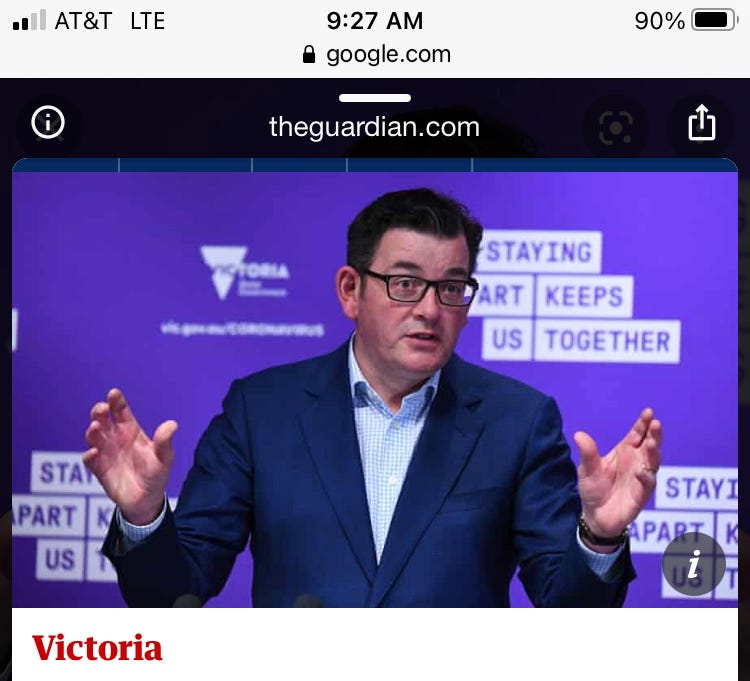
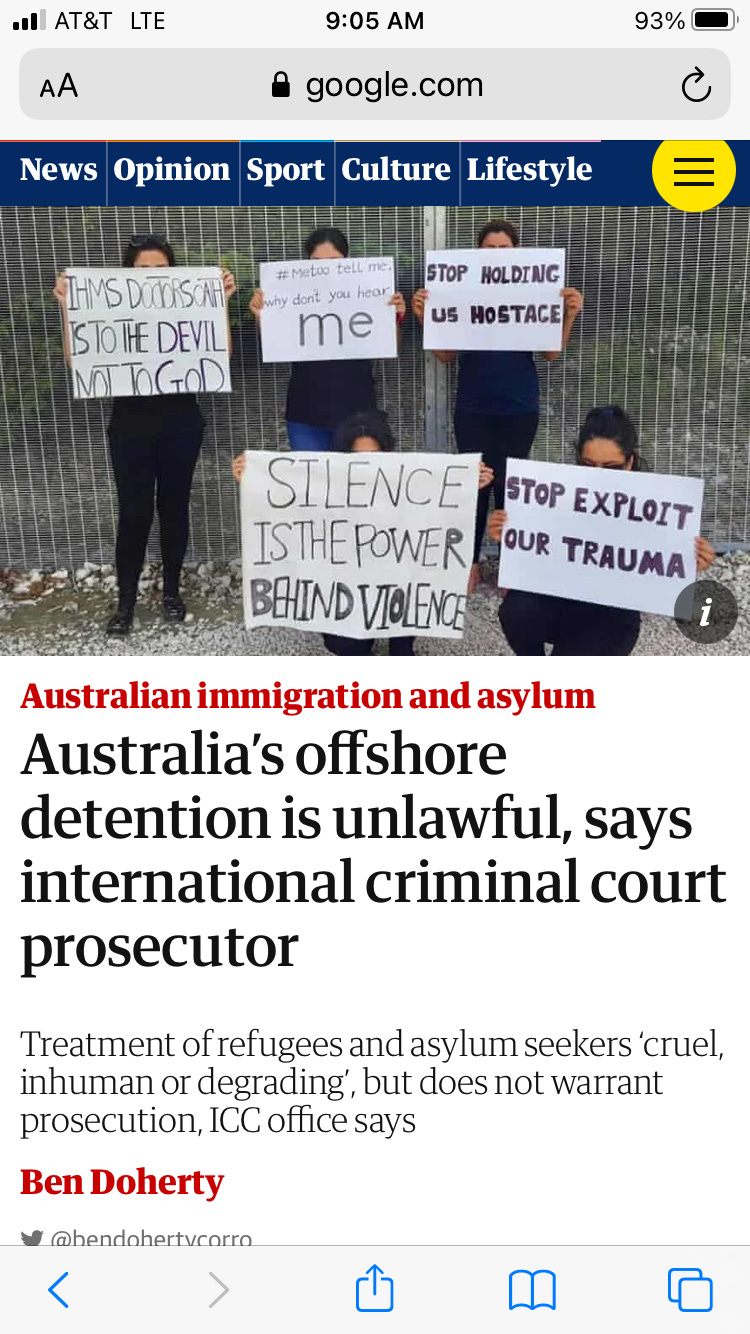
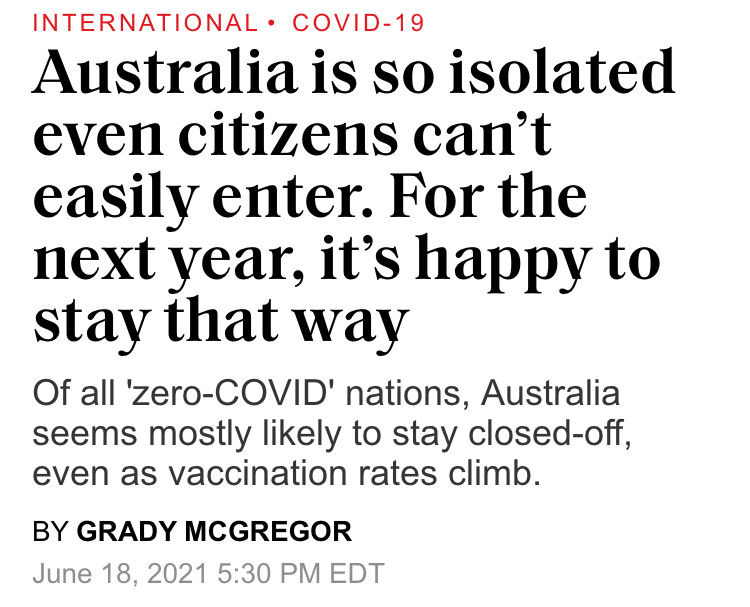
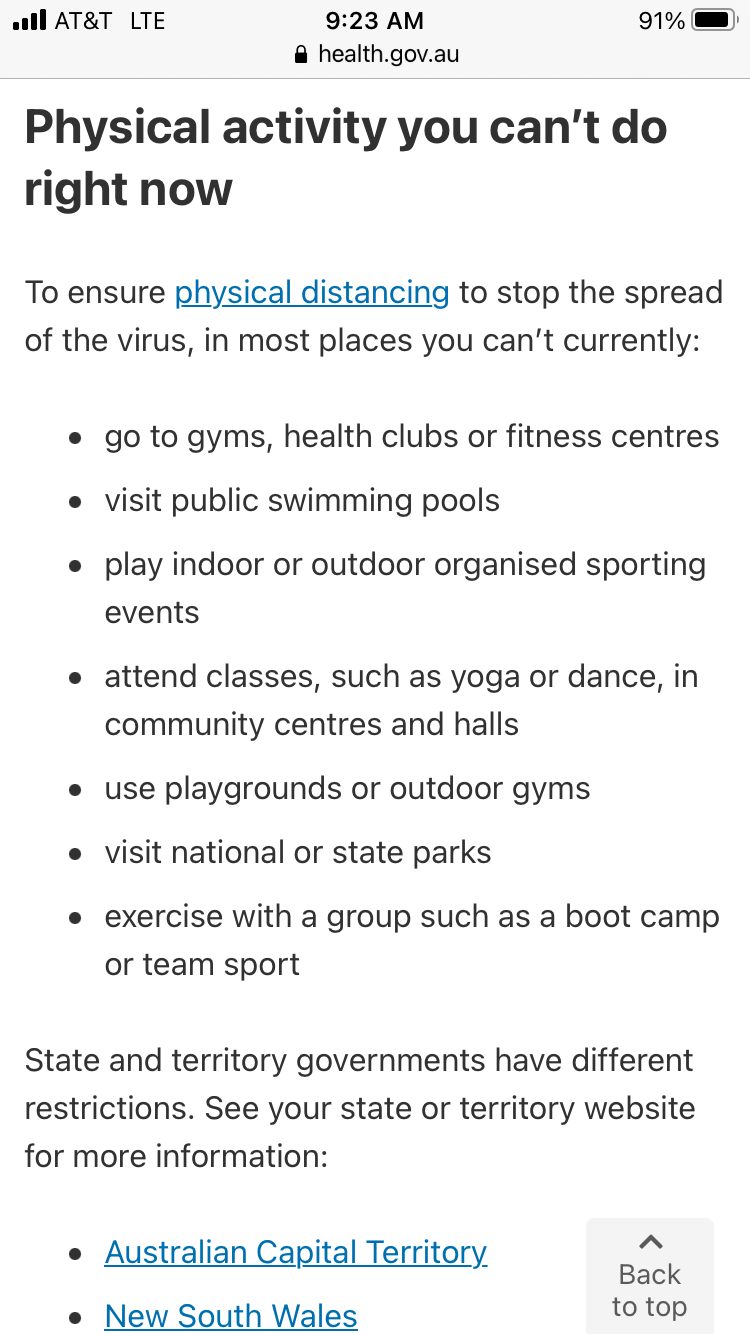
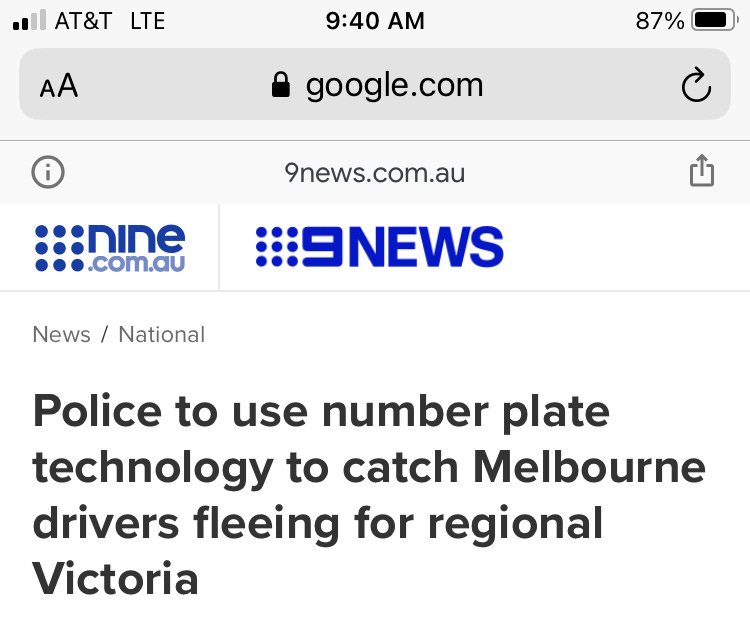
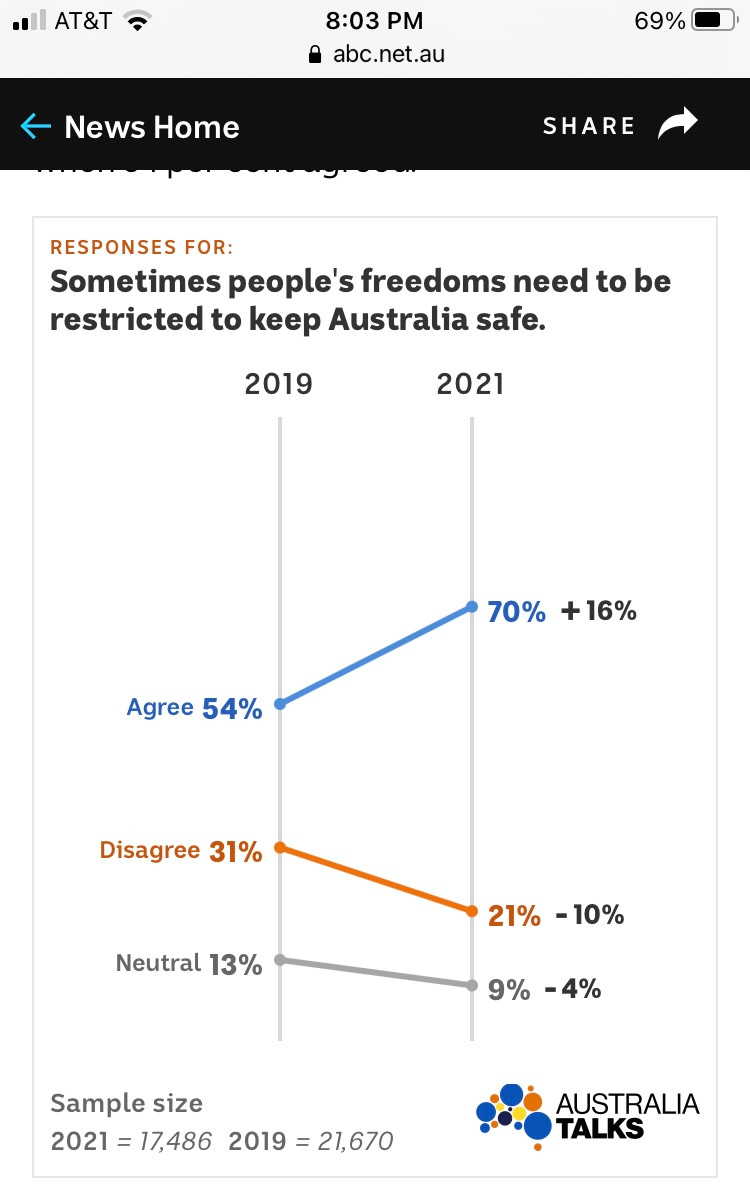
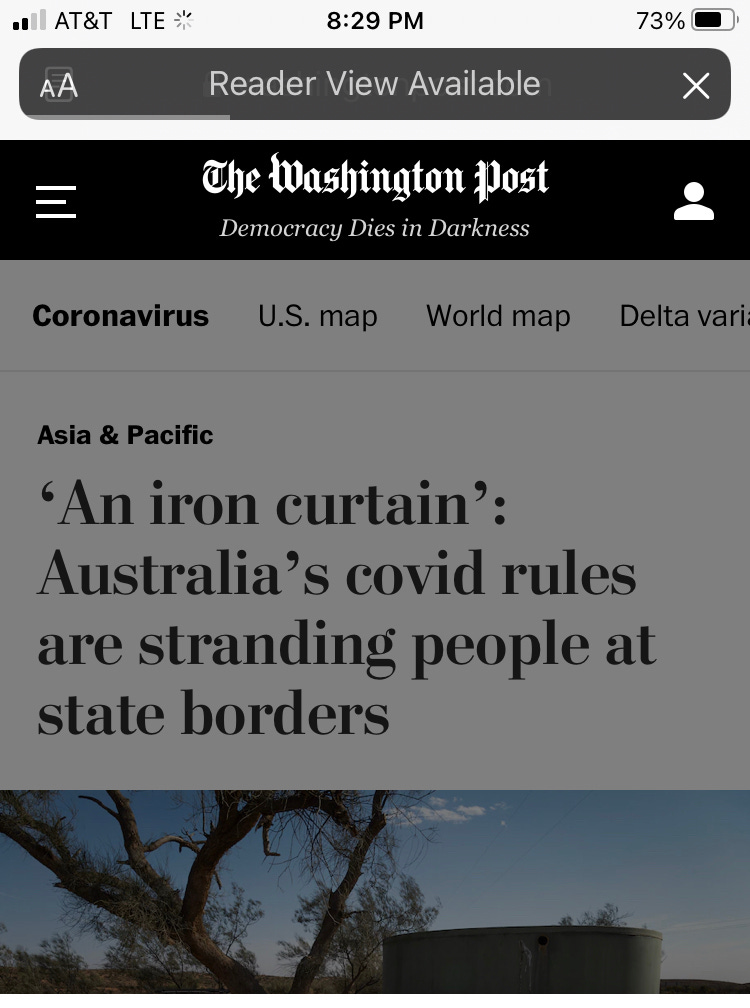

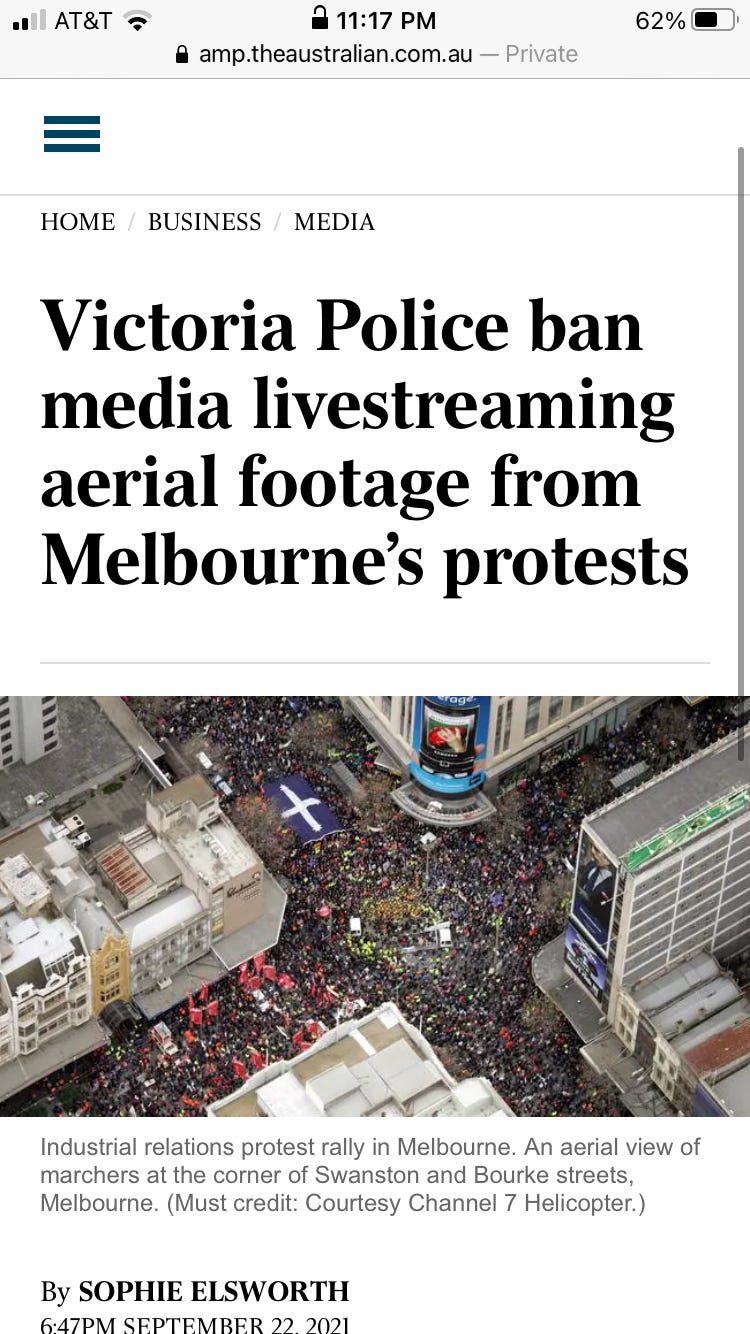
Comments
Post a Comment